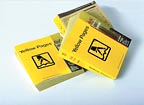
When it comes to advertising exposure, once is not enough. Once usually is a waste of money. Once doesn't tell you whether the chosen medium is effective or not.
Small companies are prone to wasting money on a bunch of little one-time promotional buys. It does little good to buy “an” ad in a newspaper, magazine, etc. or to send out “a” mailing to prospective customers or to do anything else to promote yourself on a one-time basis.
The chances that a prospect will just happen to see your ad the one time you just happen to advertise are very slim. If you decide to advertise, start small, go slowly and give it a chance. Run your ad at least six times or over the course of six months.
You don't need an expert to tell you that big ads generally work better than small ads. However, if you have a limited budget, most advertising pros will tell you that you can get better bang for your buck running smaller ads frequently rather than larger ads once in a while. Size is not as much a factor in advertising success as repetition.
Marketing consultant Dr. Jeffrey Lant authored a book called The Rule of Seven, which contends that if you want prospects to take action and buy what you are selling, then you must connect with that person a minimum of seven times in an 18-month period with either paid advertising or free publicity.
There are a many reasons why you must repeat advertising for it to be effective. Here are 10 of them:
1. People are busy.
The first time they see your ad, they may be interested in your services but have other commitments that take precedence. If they saw your ad a second time or third time, they might take action.2. They forget it.
Think of how many times you vaguely recall seeing an ad for a given product or service, but when it comes time to buy, you can't remember the name.3. They don't have a pressing need right now.
But next month they might, or the month after. The more often they see your name, the greater the likelihood they'll give you a call when they need your service.4. They are lazy.
They mean to give you a call but just don't get around to it. So you have to keep reminding them.
5. People may miss your ad.
No medium delivers 100 percent of its total audience at all times. But the more often you advertise, the better your chance of connecting.6. They have qualms about your business.
Maybe they've heard something bad about you from a competitor or a customer whose job didn't go too well. Over time, that will fade from memory. Meantime, repetition tends to reinforce your message and reassure people that you are respectable. Various studies have shown that advertising messages can work effectively to drown out negative perceptions, but it does take time and many exposures to the message for it to take hold.7. People procrastinate.
They're too busy or lazy or preoccupied to call you now, but they count on seeing your ad again when they're in a better mood for making a buying decision.8. They hesitate because of the expense.
They may not have the money now, but they may have it next week or next month. Some retailers are known to time certain ads so they appear right after the 1st and 15th of the month, when many people receive their paychecks.9. They just patronized someone else.
But maybe they weren't satisfied with the service they received. Or maybe the other company will move away or close up shop. They could be receptive if they see your ad next time.10. Your ad got reinforced by something they read.
The first time they saw your ad they weren't interested. But they just read an article about new drilling techniques and suddenly turn receptive to what you're selling.Persistence pays off. A study reported by the Society for Marketing Professional Services found that 80 percent of all sales are made after the fifth call. Yet statistics show that 43 percent of salespeople make one call and quit, 25 percent make two calls and quit, and 12 percent quit after three calls.
A parallel exists with advertising. Remember that “Rule of Seven.” The more often you reach prospects, the better the chance you have of your message getting through to them.
ND

Sidebar: How to Make a Small Ad Stand Out
Most of you have limited budgets for advertising, and I suspect most of what you spend is directed toward Yellow Pages ads. I'm not a big fan of Yellow Pages (YP) advertising for your kind of business, although there are some pros as well as cons. Some good things about YP advertising is that there's no question almost everyone uses the Yellow Pages to look up businesses for one reason or another. Another is that YP ads are accessible all the time, 12 months a year. That takes care of the repetition angle that is the main subject of this article.What I don't like about YP advertising is that it's expensive, overly so for some types of businesses that don't benefit as much as others. Also, it creates an environment in which advertisers are clustered together with competitors. Bigger ads usually will draw better than smaller ads, and that gets expensive.
Here are three tips for making a small ad stand out amid larger ads, whether in the Yellow Pages, in a newspaper or any other print medium:
- Run it in color
- Use reverse type
- Use a distinctive border
Doing any or all of these things sometimes can generate more calls for a small ad than a larger one. One big caveat, however: If all the advertisers do this, it's better to do the opposite. If every other ad on a newspaper or YP page uses reverse type, better to have yours in normal print. If all the others are in color, yours will stand out more in black and white.




Report Abusive Comment